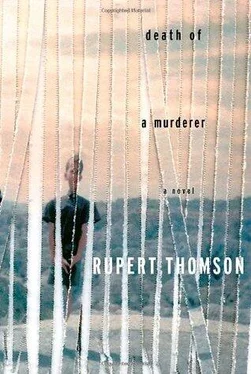He looked away in case she noticed he was grinning. He was just thankful that she was there, that she was all right, that she was herself — so indisputably, uniquely, herself. What if he hadn’t woken? Who knows where she might have ended up? She didn’t realise that bad things could happen. She had no fear. He had to feel it for her. In the last days of 1999, when he climbed up on to that deserted moor, he had imagined a man leading a boy along a shallow gully. He had been able to see it all, almost as if it were happening in front of him — two figures walking away, hand in hand, one in a dark coat, the other in shorts — and in that moment he had thought of Emma and how vulnerable she was. She was even more trusting. She knew even less. She wouldn’t have had the first idea. That was what he had thought, and then he’d felt awful, because Emma was still alive…
After several failed attempts, he finally managed to lure her back into the house with the promise of a midnight feast. Once she had devoured her biscuits and chocolate milk, he tucked her in and kissed her on the forehead. She had to go to sleep, he told her. He would see her in the morning.
“Sing,” she said.
Though tired, his grin returned. Not for nothing did he call her “Captain”—or even, sometimes, “Chief Inspector.”
He sang a few numbers from musicals to start with— Mary Poppins and West Side Story —and he followed those with a medley of his all-time favourites, including “You’ve Lost That Lovin’ Feeling,” “Waterloo Sunset,” “Massachusetts” and “Help Me Make It Through the Night.” He even sang songs he didn’t know he knew, songs they used to play in tacky Greek and Spanish discos when he was young: “Una Paloma Blanca,” “Sweet Caroline” and “Lady in Red.” He went on singing long after Emma had fallen asleep. He was singing because he was worried. He was singing because he was relieved. He sang until his voice hurt, then he kissed Emma one last time and crept back across the landing. As he pulled off his wellingtons, he noticed that Sue was awake. He could see a glint on the pillow where her eyes were.
“You’re a dark horse,” she said.
His heart beat high in his throat. Had he let something slip? What had she found out?
“All these years we’ve been together,” she said, “and you never told me you liked Neil Diamond.”
She could still make him laugh, even at half-three in the morning.
“I don’t like Neil Diamond actually,” he said as he slid beneath the duvet.
“Liar,” she said.
He held on to that fragment of conversation. He would go back over it when he was parked down by the river, setting it against all their anxieties and disagreements, wanting it to weigh more.
You’re a dark horse, he would say to himself as he turned the car around and started for home.
Or, Liar.
Venetia, though. Nothing had prepared him for the effect that she would have on him. Even her name. It was unlikely, expensive — the sort of name one of Raymond’s girlfriends might have. Born to a Scottish father and an Indian mother, she had spent most of her childhood in Glasgow, only moving to Liverpool when she was fourteen, and her voice had something of both cities in it, with the lilt or rhythm of Bombay underneath. Three ports, one voice. Was it the sound of her that he fell in love with? Perhaps. But the sight of her, on Lacey Street, was enough to bring him to a standstill. For a few seconds, he forgot to breathe. Her hair so black and shiny that he could almost see himself in it. Her eyes as well. Her skin was dark too, but also lemony, somehow, as if yellow had been overlaid with a patina of translucent black.
Venetia McGarry.
The first time he saw her, she was driving a white Ford Fiesta. She had pulled up at the junction with Victoria Road and was signalling right. She looked him in the eyes, but only for a moment, then she leaned forwards in her seat to see whether anything was coming. She had a bald tyre, he noticed. Front left. For some reason, he didn’t book her, though; he simply stepped back from the kerb so she could look beyond him. Once she had established that the road was clear, she smiled at him, and he waved an arm out sideways, meaning not just that he was letting her go first, but that she should go with his blessing. The whole incident lasted fifteen seconds at the most, and though he thought about her on and off for the rest of the day, he certainly never expected to run into her again.
When he saw her the second time, in a pub in Liverpool, more than six months had passed, and she had no memory of ever setting eyes on him before, not even when he told her exactly what had taken place and where. She was surprised that he remembered it all in such detail. Flattered too. Later, she said that although she found his story extremely convincing she didn’t believe it, not for a moment. She assumed he was making the whole thing up. Though that, in itself, was quite charming, she thought. Romantic even. That he should go to the trouble of inventing a previous encounter. Not at all the kind of chat-up line she was used to. Spooky that he’d guessed the colour of her car, though. What was he? A mind-reader? Giving her an ambiguous smile, he looked away. Had he not remembered seeing her and been able to describe it, had he not been equipped with that memory, it was quite possible that nothing would ever have happened between them. As it was, he could turn back to her and tell her something else: her front left tyre had hardly any tread on it.
“It was illegal,” he said, “but I decided to let you go.”
“Wasn’t that dangerous?” she said.
And with those words something began.
Three months on, when it was all over, he couldn’t rid himself of the suspicion that she had remembered more than she had led him to believe. That morning in Widnes, as she looked through her car window, she would have noticed the uniform he was wearing. The idea could have occurred to her there and then. Not that she necessarily thought she would run into him again. Someone like him, though. A policeman. But if that was true, it undermined every moment they had spent together, and no matter how sceptical he felt, or how bitter, he couldn’t bring himself to admit that the entire relationship might have been a sham. It was just too much to lose.
Billy had gone to Paradise Street with Neil Batty, and when Neil left the pub at around nine, he started talking to Venetia, who was sitting at the next table. She had friends with her — Simon, her flatmate, and Beryl, who was on the dole — and after a while the four of them went upstairs. On the first floor was a bar that had a pool table. Something by the Specials was playing as they walked in, Terry Hall’s voice floating high above a typically nervy but hypnotic beat. Venetia was drinking Southern Comfort on the rocks. He was captivated by her, but paralysed; as in a dream he felt that if he reached for her she’d always be an inch beyond his fingertips. All he could do was gaze at her when she wasn’t looking. He couldn’t understand why everyone wasn’t gazing at her. She was that gorgeous. Then, without any warning, she moved towards him through the smoke-filled air, and suddenly she was up against him, sideways-on, like a conspirator, and he felt a heavy object drop into his jacket pocket.
“That’s for you,” she said.
Off she went again, with her long hair pouring down her back and her double Southern Comfort on the rocks. Halfway across the bar, she turned and smiled at him over her shoulder.
Christ.
He fell in love with her right then — or was it moments later, in the privacy of the Gents, when he reached a hand slowly, tentatively, into his pocket and watched it emerge with the black ball from the pool table?
Читать дальше












